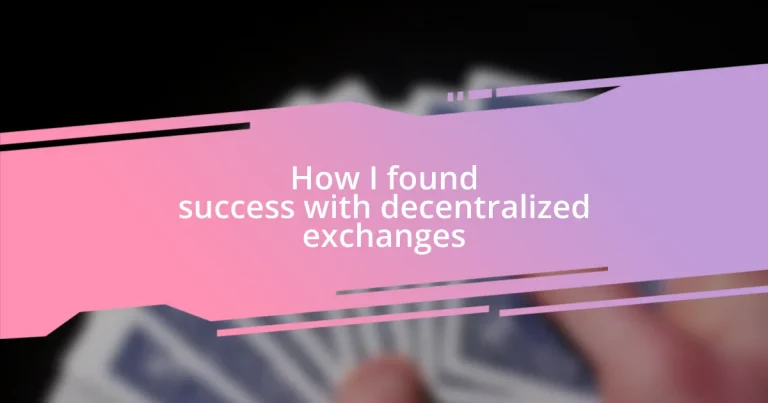Key takeaways:
- Decentralized exchanges (DEXs) offer users full control over assets, transparency through public ledgers, and access to a diverse range of tokens without intermediaries.
- Key benefits of DEXs include user sovereignty, enhanced privacy, reduced fees, global accessibility, and instant settlement of trades.
- Strategies for successful trading on DEXs involve leveraging limit orders, diversifying investments, and staying informed about security measures and gas fees to optimize performance.
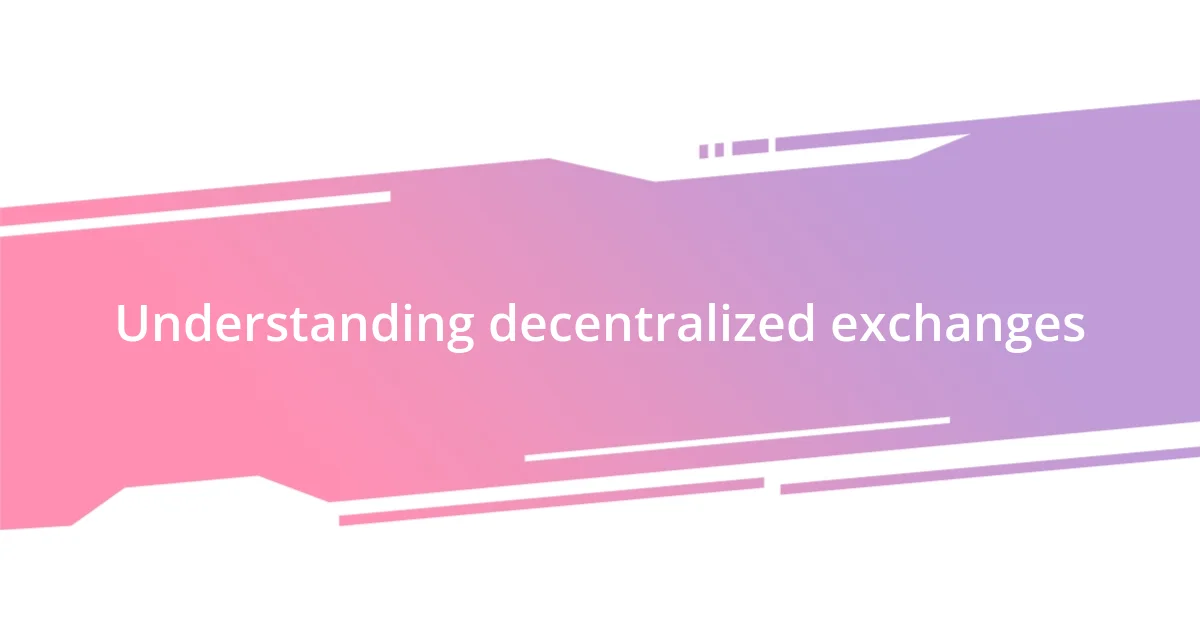
Understanding decentralized exchanges
Decentralized exchanges (DEXs) operate on blockchain technology, allowing users to trade cryptocurrencies directly without intermediaries. I remember the first time I tried using a DEX; it felt like stepping into a new realm where I controlled my assets completely. Isn’t it liberating to think that you don’t have to rely on a centralized authority to manage your trades?
What truly struck me about using DEXs was the transparency they offer. Each transaction occurs on a public ledger, which fosters a sense of trust among users. I often reflect on how this transparency contrasts sharply with my experiences on traditional exchanges, where fees can be hidden, and access to my funds can sometimes feel restricted.
Additionally, the variety of tokens available on DEXs fascinated me. I recall stumbling upon a lesser-known project that intrigued me, and within moments, I was able to invest, something nearly impossible on conventional platforms. Doesn’t it feel exciting to have such freedom at your fingertips, navigating a landscape filled with opportunities?
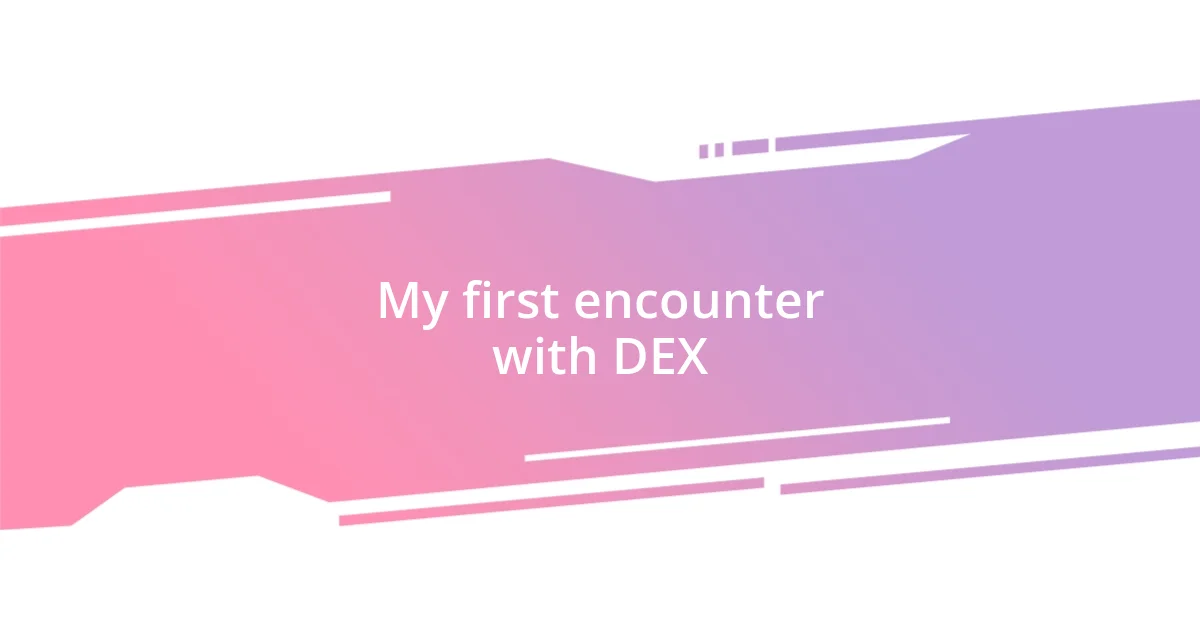
My first encounter with DEX
I vividly remember my first experience with decentralized exchanges, or DEXs, back when I was still figuring out the cryptocurrency landscape. I had just finished attending an online webinar about blockchain technology and the idea of trading without intermediaries fascinated me. When I finally made my first trade on a DEX, it felt like unlocking a new level in a video game—there was a rush of excitement knowing that my assets were entirely in my control.
As I navigated through the platform, I was taken aback by how intuitive it was. The interface was user-friendly, yet I could feel the gravity of the technology behind it. I experienced a moment of pride when I executed my first transaction; it was just me and the blockchain, no middleman to second-guess. I think that realization—being directly connected to the community and the technology—made me appreciate DEXs even more.
Thinking back, I can’t help but smile at the sense of freedom that accompanied my initial trades. It was refreshing to have immediate access to a diverse range of assets, unlike those constraining lists on centralized exchanges. Each time I stumbled upon a new token, it was like uncovering hidden treasures. Wouldn’t you agree that the thrill of discovery is a huge part of investing?
| Feature | Decentralized Exchanges (DEXs) |
|---|---|
| User Control | Full control over assets, no intermediaries |
| Transparency | Public ledger for all transactions |
| Token Variety | Access to numerous lesser-known tokens |
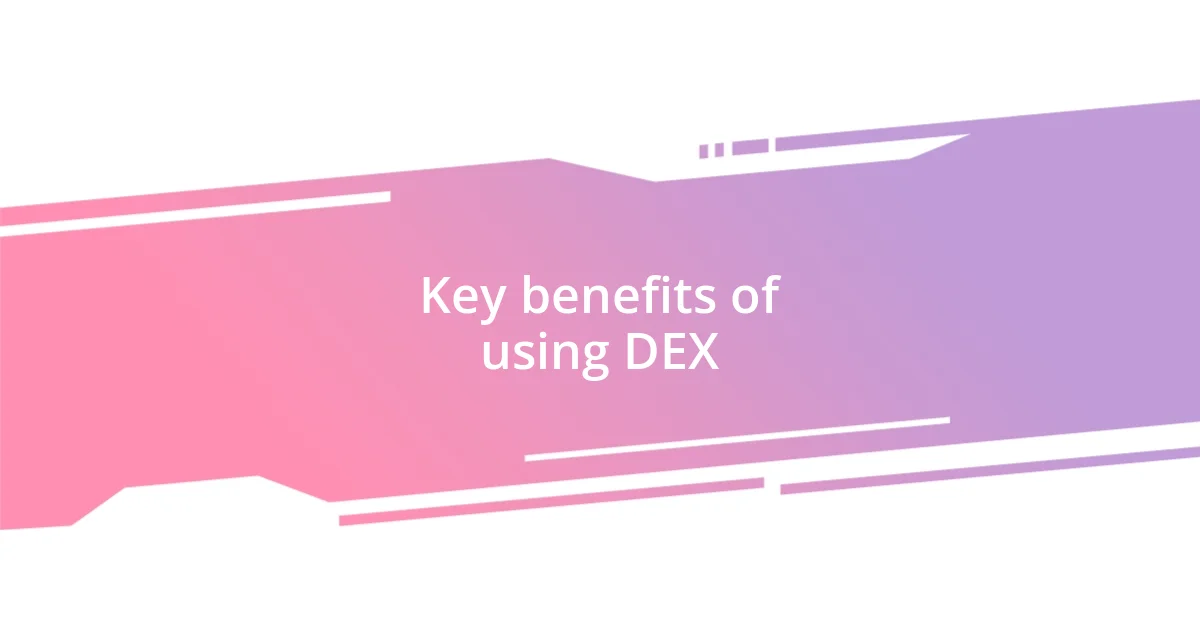
Key benefits of using DEX
Using decentralized exchanges has been a transformative experience for me. One of the most significant benefits I’ve found is the ability to trade assets without the constraints often found in centralized platforms. There was a moment when I decided to sell a token I had been holding for a while; the speed and efficiency of that transaction left me in awe. I hardly felt any anxiety, knowing I had complete control over my funds. The thrill of executing a trade seamlessly—without having to navigate through layers of bureaucracy or waiting for approvals—is simply unmatched.
Some of the key benefits of using DEXs include:
- User Sovereignty: No reliance on intermediaries, allowing for direct control over transactions.
- Enhanced Privacy: Minimal data collection and no centralized database means your trading history is kept private.
- Reduced Fees: Typically, DEXs charge lower trading fees, increasing profitability on trades.
- Global Accessibility: Anyone with an internet connection can participate, making trading more inclusive.
- Instant Settlement: Trades are executed immediately, leading to faster confirmation times compared to centralized exchanges.

Choosing the right DEX platform
Choosing the right DEX platform can significantly impact your trading experience. During my exploration, I found that not all DEXs are created equal when it comes to user experience and security. I remember feeling overwhelmed at first, so I prioritized platforms that offered robust security features and clear user interfaces to ensure that I could focus on trading rather than fumbling through complicated menus.
One crucial factor I learned is to check the liquidity of the DEX. Initially, I made the mistake of trading on a lesser-known platform with low liquidity, and I felt my trades were stalling. It was frustrating. Trading on a DEX with higher liquidity means faster execution and better pricing, which enhances the overall trading efficiency. Have you experienced waiting for your orders to fill?
Then there’s the community aspect. I tend to gravitate towards DEXs that not only provide trading services but also foster a vibrant community. I recall joining discussions on governance and token listings, feeling like I was part of something bigger. This feeling of belonging can add immense value, making the trading journey not just profitable but also personally rewarding. Choosing the right DEX platform is about aligning your values, preferences, and trading strategy with what the platform offers.
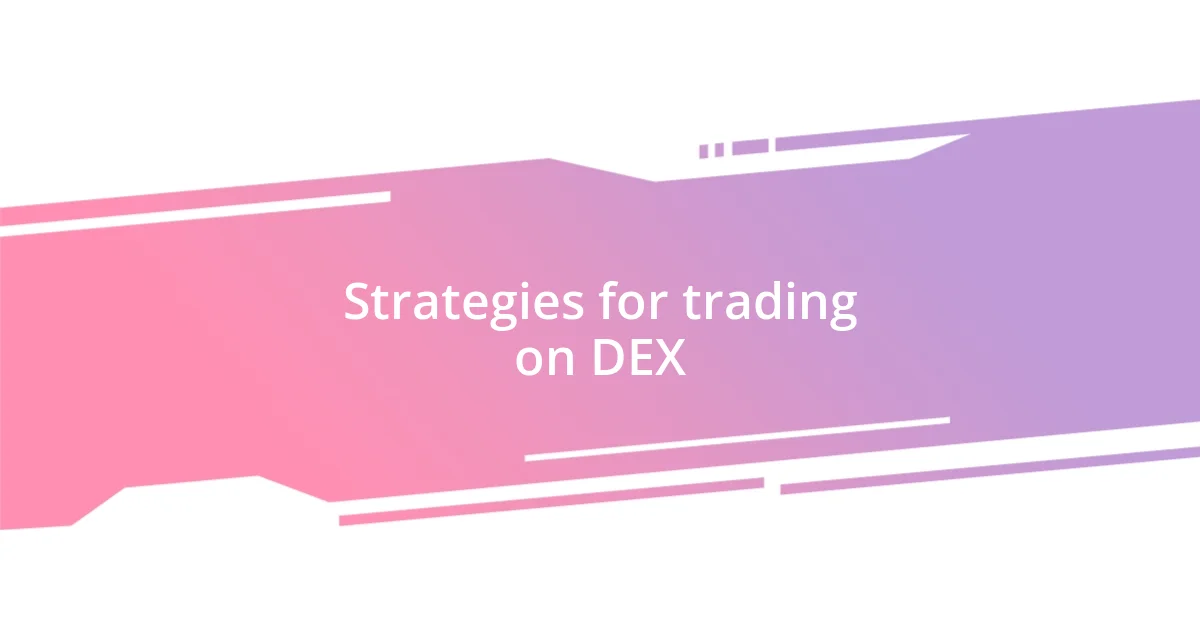
Strategies for trading on DEX
When it comes to trading on decentralized exchanges (DEXs), developing a well-thought-out strategy is vital. I remember initially jumping into trades without a clear plan, driven by the excitement of rapid market movements. Over time, I realized that setting specific entry and exit points transformed my trading approach. It provided me with the discipline to withstand the emotional rollercoaster that often accompanies trading.
One strategy I found particularly effective is to leverage limit orders. In my early days, I often used market orders, but the slippage I experienced was eye-opening. By placing limit orders instead, I gained control over my trades, allowing me to capitalize on favorable price movements without the unease of unexpected fills. Have you ever watched a trade slip away because you weren’t quick enough? I certainly have, and it pushed me to refine my strategies for better outcomes.
Diversification is another key strategy that reshaped how I approach DEX trading. Initially, I tended to put all my resources into trending assets, but I’ve learned that spreading my investments can buffer against volatility. I still recall the anxious feelings when the market dipped shortly after I concentrated my trades—now, with a diversified portfolio, I find trading more manageable and less stressful. It’s about creating a safety net for yourself while still seizing opportunities for growth.

Common challenges and solutions
Navigating decentralized exchanges poses unique challenges, especially around security concerns. I recall the anxiety I felt after hearing stories of hacks and vulnerabilities on certain platforms. To mitigate this, I started to diligently research the security measures of each DEX, opting for those that were open about their protocols and had undergone third-party audits. It was a bit of work, but knowing my funds were safer made it worth the effort—how do you feel about the safety of your assets?
Another challenge I faced involved understanding the gas fees associated with transactions. At first, I was surprised to see fees eat into my profits, especially when the network was congested. I learned to track the time of day for transactions more closely, timing my trades to coincide with lower fees. Since making that adjustment, I’ve often felt one step ahead. Have you ever had your profits wiped out by fees? It’s frustrating, but being informed can really change the game.
Lastly, figuring out how to execute timely trades during volatile market conditions was daunting. In my early days, I remember watching prices fluctuate dramatically while I hesitated to act. That was when I decided to explore setting alerts through various trading tools. This proactive approach gave me the confidence to enter the market more decisively, turning the fear of missing out (FOMO) into a strategic advantage. How do you stay alert to price movements? Feeling proactive about your trading can really empower your decisions.
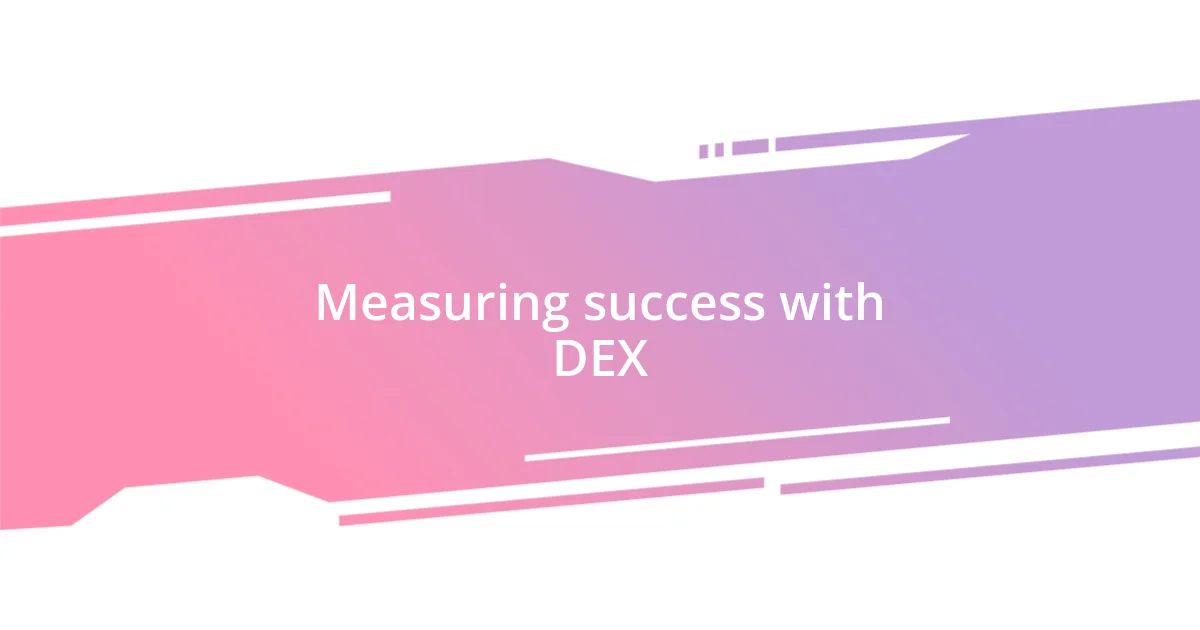
Measuring success with DEX
Success with decentralized exchanges can be quite a nuanced journey. One way I measure my success is by tracking my performance over time. In the beginning, I saved screenshots of my trades every week, noting the gains and losses. Reflecting on those metrics not only revealed my progress but also highlighted areas needing improvement. Have you ever taken a step back to examine your trading history? It can provide invaluable insights.
Another aspect I’ve found essential is community involvement. Engaging with other traders in forums and groups has enriched my understanding of DEXs. I remember a time when a fellow trader shared a lesser-known token that later skyrocketed in value. Being part of a community allows for shared learning that directly impacts my trading success. How active are you in trading communities? They can be treasure troves of information and support.
Lastly, I’ve started utilizing specific tools for analytics, which has been a game changer. By analyzing trading volume, liquidity, and historical price charts, I feel more equipped to make informed decisions. There was a moment when a sudden market shift caught me off guard because I hadn’t paid attention to those metrics. Since then, I’ve made it a habit to review analytics before each trading session. Do you have tools that help you assess your trading environment? Tapping into such resources can elevate your success on DEX platforms.












